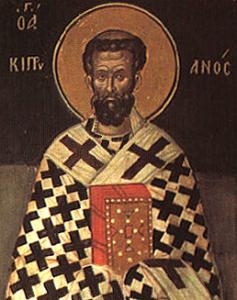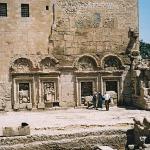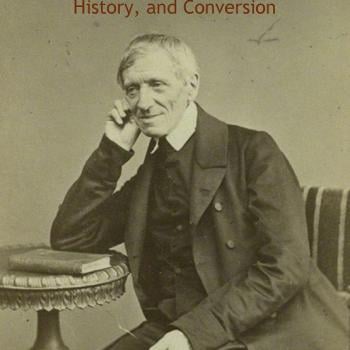
In the Acts of the Apostles, the Holy Spirit was given by the imposition of the apostles’ hands in baptism. From all which we learn that the person of the Holy Spirit was of such authority and dignity, that saving baptism was not complete except by the authority of the most excellent Trinity of them all, i.e., by the naming of Father, Son, and Holy Spirit, and by joining to the unbegotten God the Father, and to His only-begotten Son, the name also of the Holy Spirit. (Origen, De Principiis, Book I, ch. 3, 2)
Anglican patristics scholar J. N. D. Kelly summarizes Origen’s view of baptism:
It is the unique means of obtaining remission of sins [Exhort. ad mart. 30], it frees us from the power of the Devil and makes us members of the Church as Christ’s body [Hom. in Exod. 5, 5; in Rom. 8, 5]. Even little children, he assumes [In Rom. 5, 9; hom. in Luc. 14 ], being defiled with sin, must be baptized. His normal teaching [De princ. 2, 10, 7; hom. in Exod. 5, 5] is that the Spirit is received in baptism . . . The Spirit descends upon the Christian at his baptism . . . [Hom. in Luc 22; 27] (Early Christian Doctrines, HarperSanFrancisco, revised edition, 1978, 208)
Cyprian (210-258)
I used to regard it as a difficult matter, and especially as difficult in respect of my character at that time, that a man should be capable of being born again — a truth which the divine mercy had announced for my salvation — and that a man quickened to a new life in the layer of saving water should be able to put off what he had previously been; and, although retaining all his bodily structure, should be himself changed in heart and soul. (Epistle 1: To Donatus, 3)
By the help of the water of new birth, the stain of former years had been washed away, and a light from above, serene and pure, had been infused into my reconciled heart — after that, by the agency of the Spirit breathed from heaven, a second birth had restored me to a new man — then, in a wondrous manner, doubtful things at once began to assure themselves to me, hidden things to be revealed, dark things to be enlightened, what before had seemed difficult began to suggest a means of accomplishment, what had been thought impossible, to be capable of being achieved; so that I was enabled to acknowledge that what previously, being born of the flesh, had been living in the practice of sins, was of the earth earthly, but had now begun to be of God, and was animated by the Spirit of holiness. (Epistle 1: To Donatus, 4)
. . . their past sins are to be done away in baptism . . . (Epistle 22: To the Clergy Abiding at Rome, 3)
. . . the saving grace of baptism . . . (Epistle 51: To Antonianus About Cornelius and Novatian, 22)
. . . the sanctification of baptism . . . (Epistle 54: To Cornelius, Concerning Fortunatus and Felicissimus, or Against the Heretics, 13)
But in respect of the case of the infants, which you say ought not to be baptized within the second or third day after their birth, and that the law of ancient circumcision should be regarded, so that you think that one who is just born should not be baptized and sanctified within the eighth day, we all thought very differently in our council. For in this course which you thought was to be taken, no one agreed; but we all rather judge that the mercy and grace of God is not to be refused to any one born of man. . . .
Moreover, belief in divine Scripture declares to us, that among all, whether infants or those who are older, there is the same equality of the divine gift. . . . But in that is expressed the divine and spiritual equality, that all men are like and equal, since they have once been made by God; and our age may have a difference in the increase of our bodies, according to the world, but not according to God; unless that very grace also which is given to the baptized is given either less or more, according to the age of the receivers, whereas the Holy Spirit is not given with measure, but by the love and mercy of the Father alike to all. For God, as He does not accept the person, so does not accept the age; since He shows Himself Father to all with well-weighed equality for the attainment of heavenly grace. (Epistle 58: To Fidus, on the Baptism of Infants, 2-3)
But again, if even to the greatest sinners, and to those who had sinned much against God, when they subsequently believed, remission of sins is granted — and nobody is hindered from baptism and from grace— how much rather ought we to shrink from hindering an infant, who, being lately born, has not sinned, except in that, being born after the flesh according to Adam, he has contracted the contagion of the ancient death at its earliest birth, who approaches the more easily on this very account to the reception of the forgiveness of sins— that to him are remitted, not his own sins, but the sins of another. (Epistle 58: To Fidus, on the Baptism of Infants, 5)
This was our opinion in council, that by us no one ought to be hindered from baptism and from the grace of God, who is merciful and kind and loving to all. Which, since it is to be observed and maintained in respect of all, we think is to be even more observed in respect of infants and newly-born persons, who on this very account deserve more from our help and from the divine mercy, that immediately, on the very beginning of their birth, . . . (Epistle 58: To Fidus, on the Baptism of Infants, 6)
. . . those who were made sons of God by the generation of baptism. . . . by baptism the Holy Spirit is received . . . the Lord speaks to the Samaritan woman, saying, Whosoever drinks of this water shall thirst again; but whosoever drinks of the water that I shall give him, shall not thirst forever.
[John 4:13-14] By which is also signified the very baptism of saving water, which indeed is once received, and is not again repeated. (Epistle 62: To Caecilius, 8)
. . . the water of life eternal, should be given to believers in baptism, . . . (Epistle 62: To Caecilius, 9)
It is required, then, that the water should first be cleansed and sanctified by the priest, that it may wash away by its baptism the sins of the man who is baptized; because the Lord says by Ezekiel the prophet: Then will I sprinkle clean water upon you, and you shall be cleansed from all your filthiness; and from all your idols will I cleanse you: a new heart also will I give you, and a new spirit will I put within you.
[Ezekiel 36:25-26] (Epistle 69: To Januarius and Other Numidian Bishops, on Baptizing Heretics, 1)
. . . he must be baptized, that he may become a sheep, because in the holy Church is the one water which makes sheep. (Epistle 70: To Quintus, Concerning the Baptism of Heretics, 2)
And now also, when we had met together, bishops as well of the province of Africa as of Numidia, to the number of seventy-one, we established this same matter once more by our judgment, deciding that there is one baptism which is appointed in the Catholic Church; and that by this those are not re-baptized, but baptized by us, who at any time come from the adulterous and unhallowed water to be washed and sanctified by the truth of the saving water. (Epistle 72: To Jubaianus, Concerning the Baptism of Heretics, 1)
. . . the opportunity to attain the grace of the life-giving layer and of saving baptism. (Epistle 72: To Jubaianus, Concerning the Baptism of Heretics, 3)
But it is manifest where and by whom remission of sins can be given; to wit, that which is given in baptism. (Epistle 72: To Jubaianus, Concerning the Baptism of Heretics, 7)
. . . in the Church which is one, and to which alone it is granted to bestow the grace of baptism and to remit sins, . . . they who are baptized in the Church are brought to the prelates of the Church, and by our prayers and by the imposition of hands obtain the Holy Spirit, and are perfected with the Lord’s seal. (Epistle 72: To Jubaianus, Concerning the Baptism of Heretics, 9)
. . . with the four Gospels, wherewith, by a celestial inundation, she [the Church] bestows the grace of saving baptism. (Epistle 72: To Jubaianus, Concerning the Baptism of Heretics, 10)
If heretics are devoted to the Church and established in the Church, they may use both her baptism and her other saving benefits. (Epistle 72: To Jubaianus, Concerning the Baptism of Heretics, 11)
For it is no small and insignificant matter, which is conceded to heretics, when their baptism is recognised by us; since thence springs the whole origin of faith and the saving access to the hope of life eternal, and the divine condescension for purifying and quickening the servants of God. For if any one could be baptized among heretics, certainly he could also obtain remission of sins. If he attained remission of sins, he was also sanctified. If he was sanctified, he also was made the temple of God. I ask, of what God? If of the Creator; he could not be, because he has not believed in Him. (Epistle 72: To Jubaianus, Concerning the Baptism of Heretics, 12)
Wherefore baptism cannot be common to us and to heretics, to whom neither God the Father, nor Christ the Son, nor the Holy Ghost, nor the faith, nor the Church itself, is common. And therefore it behooves those to be baptized who come from heresy to the Church, that so they who are prepared, in the lawful, and true, and only baptism of the holy Church, by divine regeneration, for the kingdom of God, may be born of both sacraments, because it is written, Unless a man be born of water and of the Spirit, he cannot enter into the kingdom of God.
(Epistle 72: To Jubaianus, Concerning the Baptism of Heretics, 21)
Baptism . . . can neither be separated from the Church nor from the Holy Spirit. (Epistle 73: To Pompey, Against the Epistle of Stephen About the Baptism of Heretics, 4)
For he who has been sanctified, his sins being put away in baptism, and has been spiritually reformed into a new man, has become fitted for receiving the Holy Spirit; since the apostle says, As many of you as have been baptized into Christ have put on Christ.
[Galatians 3:27] (Epistle 73: To Pompey, Against the Epistle of Stephen About the Baptism of Heretics, 5)
The blessed apostle sets forth and proves that baptism is that wherein the old man dies and the new man is born, saying, He saved us by the washing of regeneration.
[Titus 3:5] . . . regeneration is in the washing, . . . (Epistle 73: To Pompey, Against the Epistle of Stephen About the Baptism of Heretics, 6)
. . . in baptism, that so, being already born, he may receive the Holy Spirit, . . . the birth of Christians is in baptism, while the generation and sanctification of baptism are with the spouse of Christ alone, . . . the sanctification of saving baptism, . . . (Epistle 73: To Pompey, Against the Epistle of Stephen About the Baptism of Heretics, 7)
Peter himself, showing and vindicating the unity, has commanded and warned us that we cannot be saved, except by the one only baptism of one Church. In the ark,
says he, of Noah, few, that is, eight souls, were saved by water, as also baptism shall in like manner save you.
[1 Peter 3:20-21] In how short and spiritual a summary has he set forth the sacrament of unity! For as, in that baptism of the world in which its ancient iniquity was purged away, he who was not in the Ark of Noah could not be saved by water, so neither can he appear to be saved by baptism who has not been baptized in the Church which is established in the unity of the Lord according to the sacrament of the one ark. (Epistle 73: To Pompey, Against the Epistle of Stephen About the Baptism of Heretics, 11)
***
“Please Hit ‘Subscribe’”! If you have received benefit from this or any of my other 4,800+ articles, please follow this blog by signing up (with your email address) on the sidebar to the right (you may have to scroll down a bit), above where there is an icon bar, “Sign Me Up!”: to receive notice when I post a new blog article. This is the equivalent of subscribing to a YouTube channel. Please also consider following me on Twitter / X and purchasing one or more of my 55 books. All of this helps me get more exposure, and (however little!) more income for my full-time apologetics work. Thanks so much and happy reading!
***
. . . to be baptized, and sanctified in the Catholic Church, with the lawful, and true, and only baptism of the Church. (Epistle 75: To Magnus, on Baptizing the Novatians, and Those Who Obtain Grace on a Sick-Bed, 1)
The Church alone has the living water, and the power of baptizing and cleansing man . . . (Epistle 75: To Magnus, on Baptizing the Novatians, and Those Who Obtain Grace on a Sick-Bed, 3)
. . . the saving water of baptism and heavenly grace . . . (Epistle 75: To Magnus, on Baptizing the Novatians, and Those Who Obtain Grace on a Sick-Bed, 6)
. . . baptized and sanctified with a saving baptism . . . (Epistle 75: To Magnus, on Baptizing the Novatians, and Those Who Obtain Grace on a Sick-Bed, 8)
. . . in baptism every one has his own sins remitted . . . (Epistle 75: To Magnus, on Baptizing the Novatians, and Those Who Obtain Grace on a Sick-Bed, 11)
. . . they cannot be baptized who have already been sanctified by ecclesiastical baptism . . . (Epistle 75: To Magnus, on Baptizing the Novatians, and Those Who Obtain Grace on a Sick-Bed, 13)
When, however, they come to the water of salvation and to the sanctification of baptism, we ought to know and to trust that there the devil is beaten down, and the man, dedicated to God, is set free by the divine mercy. For as scorpions and serpents, which prevail on the dry ground, when cast into water, cannot prevail nor retain their venom; so also the wicked spirits, which are called scorpions and serpents, and yet are trodden under foot by us, by the power given by the Lord, cannot remain any longer in the body of a man in whom, baptized and sanctified, the Holy Spirit is beginning to dwell. (Epistle 75: To Magnus, on Baptizing the Novatians, and Those Who Obtain Grace on a Sick-Bed, 15)
All indeed who attain to the divine gift and inheritance by the sanctification of baptism, therein put off the old man by the grace of the saving layer, and, renewed by the Holy Spirit from the filth of the old contagion, are purged by a second nativity. (Treatise 2: On the Dress of Virgins, 23)
. . . we who were sanctified in baptism . . . (Treatise 4: On the Lord’s Prayer, 12)
. . . in baptism remission of sins is granted . . . (Treatise 8: On Works and Alms, 2)
Let us, then, who in baptism have both died and been buried in respect of the carnal sins of the old man, who have risen again with Christ in the heavenly regeneration, both think upon and do the things which are Christ’s, . . . (Treatise 10: On Jealousy and Envy, 14)
In the baptism of water is received the remission of sins, . . . (Treatise 11: Exhortation to Martyrdom, Addressed to Fortunatus, Preface, 4)
*
Practical Matters: Perhaps some of my 4,800+ free online articles (the most comprehensive “one-stop” Catholic apologetics site) or fifty-five books have helped you (by God’s grace) to decide to become Catholic or to return to the Church, or better understand some doctrines and why we believe them.
Or you may believe my work is worthy to support for the purpose of apologetics and evangelism in general. If so, please seriously consider a much-needed financial contribution. I’m always in need of more funds: especially monthly support. “The laborer is worthy of his wages” (1 Tim 5:18, NKJV). 1 December 2021 was my 20th anniversary as a full-time Catholic apologist, and February 2022 marked the 25th anniversary of my blog.
PayPal donations are the easiest: just send to my email address: [email protected]. Here’s also a second page to get to PayPal. You’ll see the term “Catholic Used Book Service”, which is my old side-business. To learn about the different methods of contributing (including Zelle), see my page: About Catholic Apologist Dave Armstrong / Donation Information. Thanks a million from the bottom of my heart!
*
***
*
Photo credit: Russian icon of Cyprian of Carthage [public domain / Wikimedia Commons]
Summary: I document the views of Origen (c. 185-c. 254) & Cyprian (210-258) on baptism: particularly baptismal regeneration: all of them consistent with Catholic teaching.













